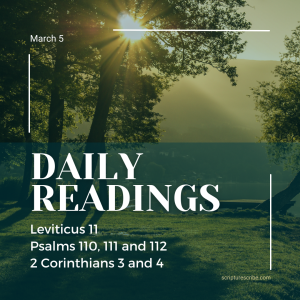
Sunday May 04, 2025
Thoughts on the readings for May 5th (Deuteronomy 22, Song of Solomon 2, Acts 14, 15)
After leaving Antioch in Pisidia following the persecution from the Jews Paul and Barnabas come to Iconium and enter the synagogue and begin preaching. Chapter 14 of Acts tells of the unbelieving Jews who stir up the peace of the city, whose people then make an attempt to stone the two Apostles. Their response is to flee to the nearby cities of Lystra and Derbe in Lycaonia (which means “wolf country”) in the wild north of Turkey. Verse 10 says that the Apostles cure a crippled man. The unsophisticated heathen now decide that Paul and Barnabas are gods clothed as men. These citizens think that Barnabas is Zeus, the chief god; and Paul is Hermes, the messenger of Zeus. Paul and Barnabas quickly tear their own clothes trying to convince the pagan priests that the Apostles are men like themselves. Paul and Barnabas teach the people of Lystra from the Word of God. The first quotation used was from Jeremiah 10:12 – one should read the entire context where “Yahweh the Living God” is contrasted with the idols of the nations. Next the population of Lystra turn on Paul, who continues to be persecuted by the Jews who came from Iconium. They stone Paul and drag him out of the city thinking that he was dead. Paul writes on this in 2nd Timothy 3 and I believe he also alludes to it in
2 Corinthians 1 verse 8-10 (which seems to imply that he was in fact resurrected at that time). Did Paul avoid these vicious foes? No! He stands again and walks back into Lystra – what a witness this is to the power of God. The next day the Apostles continue to travel to Derbe. These cities are part of Galatia – the Apostle Paul would later write a letter to the Galatians. Shortly after the events we have read, Paul and Barnabas revisit those believers and tell them (14:22) that, “it would be with great pressures on believers that God would bring them into His kingdom”. Paul’s personal example strongly bore witness to that. The Apostles make administrative arrangements in the communities of the believers and return to Antioch in Syria from where the first missionary journey had started. There they rejoice with their home ecclesia about what God had accomplished through them. Chapter 15 commences by telling us that the Apostles, Paul and Barnabas, had not been with their home ecclesia for very long before believers from Jerusalem come to Antioch in Syria seeking to enforce Jewish customs on these newly baptised converts. A decision is made to resolve the matter by way of a conference in Jerusalem- the year is 44AD. Verse 5 speaks of the matters which are of prime concern to the converts from the Pharisees ie circumcision and the keeping the laws of Moses. Peter commences the discussion by explaining how by the conversion of Cornelius God had indicated that these matters were not necessary. What mattered was what they believed. Further the keeping of law was a yoke of bondage which the Jews themselves were not able to keep. Paul and Barnabas speak next and describe how the miracles and signs God did through those Apostles was evidence of God’s acceptance of Gentiles, who He would save by His grace. James, the Lord’s half brother, who had acted as Chairman of the Conference, summarises the outcomes in verses 13-21. He adds many supporting Scriptures in his summary. The Council (Conference) writes a letter, the contents of which we are told in verses 22-35; only four binding essentials were to be required of Gentile believers and these were mostly moral behaviours and an attempt not to offend Jewish believers. Two representatives from Jerusalem (Judas and Silas) are chosen to accompany Paul and Barnabas with the circular letter letter to Gentile converts which was to begin its journey at Antioch. The chapter concludes with a sad rift between Barnabas and Paul over the matter of whether Barnabas’ nephew John Mark should accompany them in this task. The result is that Barnabas takes Mark with him and goes to Cyprus; while Paul travels with Silas throughout Syria and Cilicia.
Comments (0)
To leave or reply to comments, please download free Podbean or
No Comments
To leave or reply to comments,
please download free Podbean App.